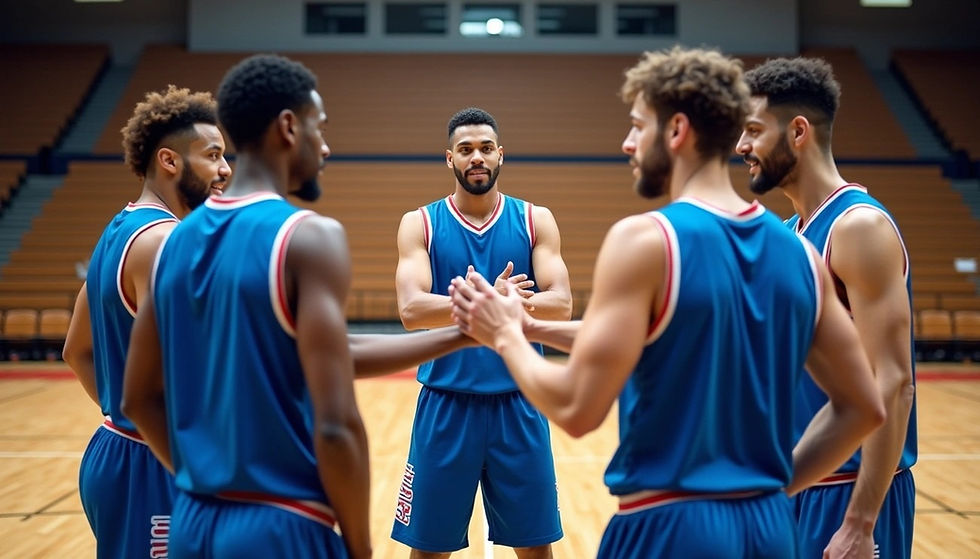Quieting Your Inner Critic in Sport: Strategies for Overcoming Self-Doubt
- Dr Paul McCarthy

- Jun 3, 2025
- 4 min read
As athletes, we often face various challenges that extend beyond the physical demands of our sport. One of the most significant hurdles is the inner critic - that small voice that sows seeds of self-doubt and insecurity. This inner dialogue can surface during competitions, practices, or even while reflecting on performance. In this blog post, we'll explore the impact of this inner critic on athletes and share personal experiences that illustrate effective strategies for silencing that voice.
Understanding the Inner Critic
The inner critic is the internal dialogue that often amplifies insecurities and casts doubt on our abilities. It can manifest in various ways, such as telling us we are not good enough or focusing on perceived failures. For many athletes, this voice is not just an occasional whisper; it can feel like a constant barrage during competitions or training sessions.
For example, I remember a particularly intense match where my inner critic screamed louder than my determination. As I missed a few key moves, that voice quickly pointed out all my past mistakes and reinforced the notion that I wasn't cut out for the sport. This moment serves as a reminder of how powerful our internal narratives can be.

The Battle of Self-Doubt
Self-doubt is a common experience among athletes, and it can manifest at the most inopportune times. During competitions, the stakes feel higher, and the inner critic often finds fertile ground to thrive. Many athletes face overwhelming pressure, leading to second-guessing decisions and anxiety before events.
Consider an athlete preparing for their first major competition. As they warm up, thoughts like “What if I let my team down?” or “What if I don’t perform well?” flood their mind. These aren't just idle thoughts; they can affect performance. Studies have shown that mental skills, such as visualization and positive self-talk, can significantly influence an athlete's focus and performance levels.
To combat these moments, it’s essential to recognize the inner critic and how it influences your mental state. Acknowledging that everyone feels self-doubt at times helps to create a shared connection among athletes. Understanding these common feelings can provide reassurance that you’re not alone in your struggles.

Strategies for Silencing the Inner Critic
While self-doubt may never vanish completely, there are strategies to manage and quiet the inner critic in sports. Here are some effective techniques I've used, which others may find relatable and helpful:
1. Positive Affirmations
One key strategy is to incorporate positive affirmations into your routine. Instead of allowing negative thoughts to dominate, replace them with empowering statements. For instance, before a competition, remind yourself, “I am trained and ready. I can handle this challenge.”
This practice reinforces self-belief and shifts your focus from fear to confidence. It can seem simple, but what we tell ourselves can have a fantastic impact on our mindset.
2. Visualization Techniques
Visualization is another effective tool to combat self-doubt. Picture yourself executing your skills perfectly in your mind before you even step out to compete. This mental rehearsal helps to create a sense of familiarity and confidence.
In my early years of training, I relied heavily on visualization. Before major competitions, I would sit quietly, close my eyes, and visualize not only my performance but also how I would feel afterward—a sense of achievement and pride.
3. Embrace Challenges as Opportunities
Instead of viewing challenges as threats, learn to see them as opportunities for growth. This mindset shift can help you reframe the fear associated with competition. A failed performance can serve as a learning experience instead of proof of inadequacy.
Using my own experiences again, I recall a time when I performed poorly in a tournament. Initially, I was devastated, letting my inner critic take control. However, I chose to analyze the performance, identify areas for improvement, and approached the next event with a new perspective. This growth mindset not only quelled my critic but also fueled my determination.

Building a Support Network
Another effective strategy is surrounding yourself with positive influences. Fellow athletes, coaches, and friends can provide crucial support, encouragement, and feedback. Instead of battling the inner critic alone, share your feelings with someone who can help reframe your thoughts.
This support network can remind you of your strengths and achievements. It can also be reassuring to hear that others have faced similar doubts, thereby normalizing the experience. Team bonding activities can help foster this spirit of community, making it easier to share struggles and successes.
The Importance of Self-Compassion
Finally, a vital component of quieting the inner critic is practicing self-compassion. Instead of harsh self-judgment, treat yourself with kindness and understanding. Acknowledge that mistakes are part of the journey and don’t define your worth as an athlete.
Reflect on this personal experience: I once participated in a competition where I faced unexpected challenges. Initially, my inner critic pointed out every flaw in my performance. But then, I reminded myself that everyone makes mistakes, and it was okay to be imperfect. Embracing self-compassion allowed me to move forward without lingering bitterness.
Finding Your Balance
Ultimately, quieting the inner critic is about striking a balance between acknowledging your inner voice and refusing to let it overpower your confidence. As we develop our mental skills and resilience, we can create a more supportive internal dialogue.
Implementing the above strategies can lead to improved performance and, more importantly, a healthier mindset. Remember that every athlete has their struggles and that the pathway to success is often paved with moments of doubt.
Taking the first steps toward reducing self-doubt and empowering yourself takes time and practice. Engaging in self-reflection, seeking support, and fostering a positive mindset are all essential components in overcoming these mental hurdles.
If you find yourself in moments of doubt, recall that even the best athletes face their inner critic. You have the power to quiet that voice and thrive in your sport. Start your journey toward a more confident you today!









